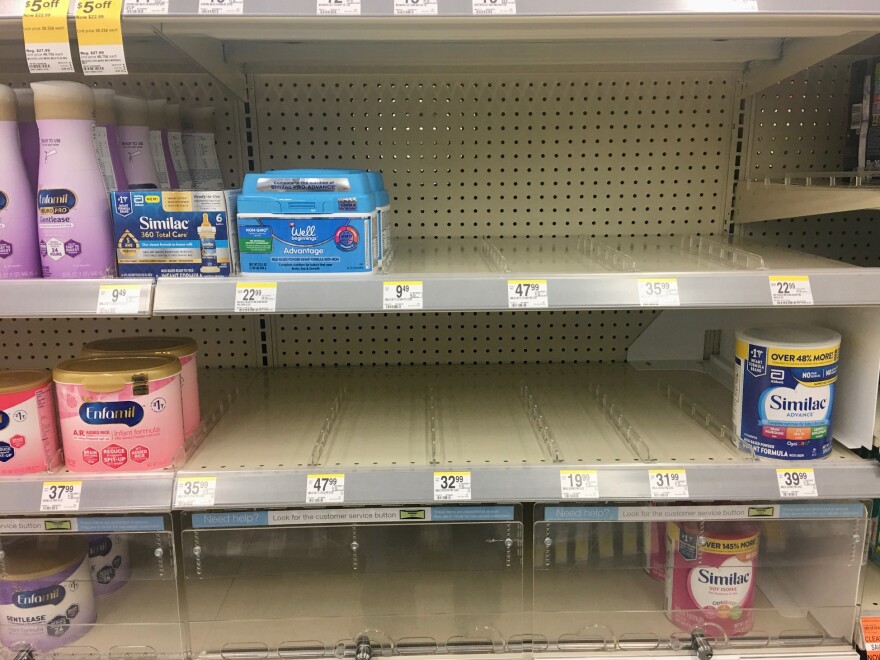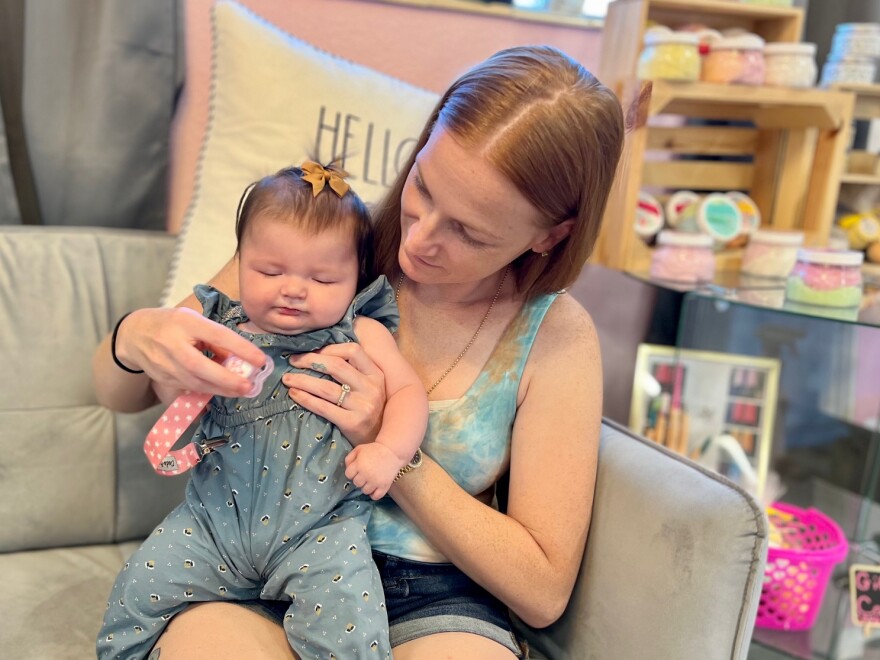Jordan Levine of Tampa knew being a first-time mom would come with some sleepless nights, but she didn’t expect buying baby formula would be the reason.
“Some nights I lie awake for hours going through all the stores around here,” said Levine, 30, with her four month-old daughter Emberly cooing on her lap.
When Levine gave birth to Emberly she had planned on breastfeeding, but couldn’t.
Now she said she is constantly on the prowl for her daughter's formula. When her searches come up empty at local stores, she will try outside the region and even out-of-state.
Levine said she has started paying friends and family in other parts of the country to send her product if she can't find it within a couple hours’ drive.
“‘Hey, could you please go over and pick this up please? And bring your husband with you so you get two allotments’ worth’” Levine said, referring to the limits many stores have put on how much formula one person can buy each day.
“As a mother you have to do what you have to do,” she said.
Out-of-stock rates are soaring
The company Datasembly has been tracking the formula shortage. Its latest report found as of May 8, 43% of baby formula products in the nation were out-of-stock, up from 31% in April and 23% in January.
“This issue has been compounded by supply chain challenges, product recalls and historic inflation,” CEO of Datasembly Ben Reich said in a statement. “The category started to see stocking challenges beginning in July 2021, and the situation has continued to worsen into 2022.”

In February the U.S. Food & Drug Administration recalled certain products from that Abbott Nutrition sold under the brands Similac, Alimentum and EleCare after an outbreak of bacterial infections left at least four babies hospitalized and two dead.
Levine’s daughter Emberly was taking Similac formula so Levine exchanged it for a different brand. It wasn’t an easy experience, she said, because Emberly has a sensitive stomach.
“And then when we did find one that worked for her, we can't find it on the shelf anymore,” she lamented.
Other families in Florida have voiced similar struggles on social media, and area clinics are getting lots of calls from parents anxious about the shortage, including some run by Johns Hopkins All Children’s Hospital in St. Petersburg and Sarasota.
Don't try this at home
Dr. Rachel Dawkins, medical director of the hospital’s Pediatric and Adolescent Medicine clinics, said she is concerned by the prevalence of recipes floating around the Internet for homemade formulas not regulated by the FDA.
“If you're making your own formula at home, it might not have the appropriate nutrients to help your baby grow,” she explained. “Especially calcium, that's what we're finding, that most of the online recipes don't contain enough calcium for your baby.”
That's not the only reason do-it-yourself solutions can be dangerous
“There is a risk that homemade formulas can be colonized with bacteria and cause serious illness in babies so we really recommend against making your own formula,” said Dawkins.
Dawkins also advises families not to water down formulas to try and make them last longer.
Resources for help
Most babies should be able to tolerate switching brands if their formula of choice is sold out, she said. But that’s more complicated for infants with specific allergies or nutritional needs.
The shortage is likely harder on low-income families, Dawkins said. They may not have the time or money to drive around from store to store looking for formulas, or have the ability to buy it online, where some third-party sellers are reportedly over-charging desperate families.
“Of course I'm worried about shortages affecting everyone, but for those people that might not have the means to pay an exorbitant amount for formula or to even go online and be able to purchase those things, we definitely worry,” said Dawkins.
Parents can reach out to their local WIC offices, which run the federal government’s Supplemental Nutrition Program for Women, Infants and Children. Staff can help low-income families get the resources they need.
Dawkins said all parents should talk to their doctors for advice and possible alternatives for hard-to-find products.
Some community members are also stepping up and offering formulas they don't need to charities and on social media.
Tampa mom Jordan Levine said she's grateful for all the help she's gotten so far, and hopes supply catches up with demand soon.
“It’s scary to have to sit and wonder where your child's next bottle is going to come from or how long you have to wait,” she said.
Officials with the Biden Administration say they're working with formula makers to ramp up production and will prioritize products most in need.
Find your WIC office
Hillsborough County has multiple WIC office locations. Here's a list of them or you can contact 813-307-8074 to make an appointment.
Pinellas County residents can call 727-824-6913 or 727-824-6914 to make appointments and click here for more information.
.
Sarasota County residents can call 941-861-2929 for the Ringling office or 941-861-3336 for the North Port office and click here for more information.
Pasco County has multiple WIC office locations. Here's a list of them or you can call 727-861-5250 to make an appointment.
Polk County residents can call 863-519-7542 or click here for more information.
Manatee County has multiple WIC office locations. Here's a list of them or you can call 941-741-3400 to make an appointment.
9(MDAyNDY5ODMwMDEyMjg3NjMzMTE1ZjE2MA001))
Copyright 2022 WUSF Public Media - WUSF 89.7


